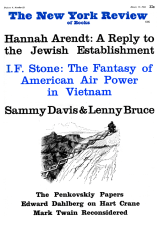In response to:
Beyond Criticism from the December 9, 1965 issue
To the Editors:
Mr. Mazzocco’s review of Lionel Trilling’s Beyond Culture has much in common with Professor Crews’s essay on Edmund Wilson. They are both irresponsible, patronizing, sniggering attacks on distinguished men of letter…Who’s next, dear Eds.?
Sylvia Marlowe
New York City
Robert Mazzocco replies:
For Professor Dupee, I’m sprightly; for Greenberg, brutal. Such are the varieties of the critical experience. However much I admire Dupee’s work—in or out of The Review—his letter, I’m afraid, is gentlemanly gibberish. Dupee wants to defend Trilling, but he doesn’t want to take the witness chair. I don’t blame him.
What Greenberg presents is a mess, which he expects others to clean up. Nevertheless, let’s go to the heart of the matter, so to speak: “Trilling finds in whatever is irreducible about our biological nature the hope of a truth by which to judge culture and in judging it to revise and control it rationally.”
While I don’t imagine Professor Trilling is enthusiastic over Hegel or Marx, he has many pretty words for the 19th century, and what the theorizing in Beyond Culture amounts to is a curious mist-spinning “dialectic”—a homemade one, to be sure. Thesis: There is an unspecified something in man’s biological nature which is irreducible. Antithesis: That irreducible something stands in opposition to the deterministic trends of modern society on the one hand, and the standard-dissolving trend of modern culture on the other. Synthesis: Man should therefore thank his stars he possesses such an irreducible something, for in it lies the possible resolution of the conflict.
Arnold, Eliot, Ortega, Maritain, etc., have all dealt with the problem and all have influenced Trilling. But whereas they, in one form or another, appeal to tradition. Trilling turns to Freud. It seems to me foolish. For if I may be allowed one more “sophomoric” query, how can something which is irreducible either be revised or—within Trilling’s biological context—really affect any revising? Are we in the realm of causality here, or the realm of revelation? By irreducible, does Trilling perhaps mean something simpler—say, man’s unconquerable spirit? Oh no, they can’t take that away from me…
When I spoke of Professor Trilling’s “tremendous distinction,” I was referring to his past performances. As a literary critic or literary historian, he is splendid. As a “thinker,” I have my doubts. Of course, it’s possible I’ve missed the point of Beyond Culture. It’s also possible to find a needle in a haystack.
This Issue
January 20, 1966



